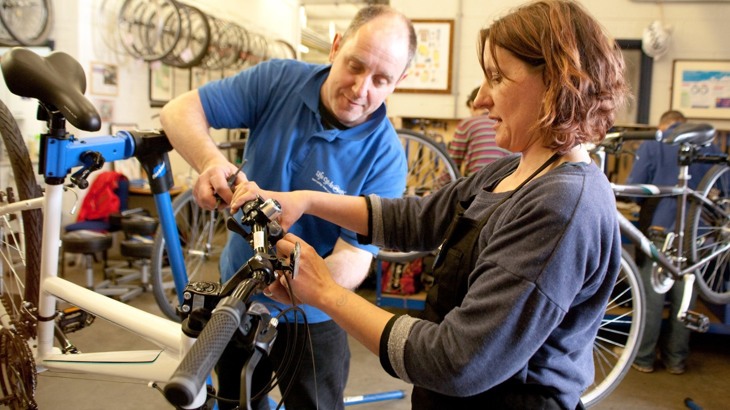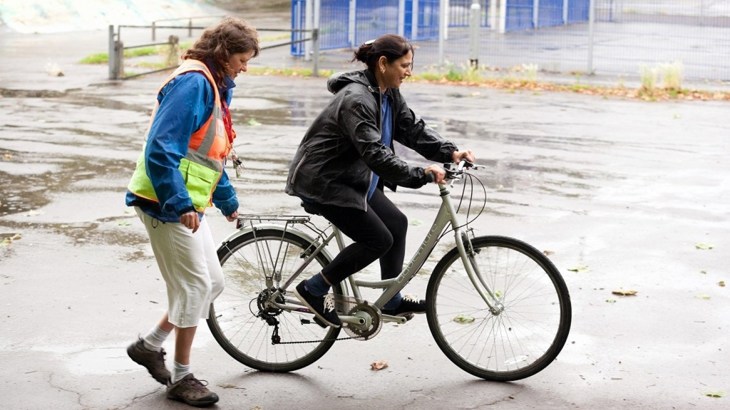More women want to cycle. Life Cycle knows this from conversations we’ve had with hundreds of women over many years about the barriers they face to cycling. More recently, quantitative evidence gathered by Sustrans has backed this up. For their 2017 Bike Life Report, Sustrans asked women and men in seven UK cities about their cycling habits and perception of cycling. In all seven areas, they found similar results: women want to cycle!

So what are the facts?
Men are twice as likely to be regular cyclists as women. In Bristol, 18% of women reported cycling at least once a week. While this was more than the city average of 12%, it was still significantly less than for men: 32% of Bristol men said they cycle at least once a week.
Strikingly, most of the women had positive views of cycling. They felt that more cycling would benefit their city, citing less traffic congestion, improved urban environment and better health as key benefits. In Bristol, 30% of women who didn’t ride a bike said they would actually like to.
Why does this matter?
It won’t have escaped anyone’s attention that we now have a climate crisis. Bristol itself has serious air quality issues, debilitating traffic congestion and rising obesity and type-2 diabetes.
Cycling is one of the few interventions that can offer a solution. Yet women are half as likely as men to benefit.
Women make up 51% of the population. By failing to provide for women’s mobility in our cities, we are failing more than half of our citizens.
If we want fair and equal access to opportunities, services and jobs, we must create cycling cultures that are inclusive to women of all ages, abilities and backgrounds.
What is the ‘Bristol Women’s Cycling Charter’?
The Charter sets out Life Cycle’s ambition to champion women’s cycling.
It calls on organisations and individuals across the city to encourage, enable and empower women to cycle. It adopts the fundamental principle that women have a right to access everything the city offers, using an equitable, affordable and healthy form of transport – the bike.
So what can businesses do to support more women to cycle?
Creating a positive cycling culture isn’t difficult.
Life Cycle has some top tips for employers, large and small to empower female staff, friends and colleagues to cycle:
#1 Sign-up to the Bristol Women’s Cycling Charter
By signing up, you are demonstrating to your female colleagues and wider networks that you are committed to empowering and enabling women to cycle - ensuring they can benefit from this affordable, healthy, convenient form of travel.
#2 Sign up to Cycle Scheme or Green Commute Initiative
Decent bikes can be expensive and many women are on low wages. Cycle Schemes are salary-sacrifice schemes that allow employees to purchase a push or electric bike in instalments over 12-months – tax and NIC-free.
Alternatively, find out about local bike projects that sell quality refurbished bikes at affordable prices:
For refurbished bikes in Bristol
#3 Provide free ‘urban cycle skills’ training
Training is empowering. It can give women the knowledge and skills to feel confident making everyday bike journeys. Instructors can help women plan the best routes from home to work.

#4 Pay cycle mileage for work travel – HMRC recommend 20p/mile
Covering mileage for work travel is standard if employees use their car. Making it standard for cycling is a great incentive to make journeys for work on two wheels! HMRC Mileage rates
#5 Book a maintenance training session
Empowering women to fix punctures and other minor mechanical problems can boost their confidence and will enable them to keep riding longer-term. lifecycleuk.org.uk/fix
Local support for the Charter
The Charter has already received support from a number of key organisations and individuals in Bristol, including Bristol’s Mayor, Marvin Rees, who said:
Support the Charter today
We ask you to support the Bristol Women’s Cycling Charter by signing-up and committing to promote cycling to other women.
Whether you are an individual or represent an organisation, we know that you will be surrounded by female colleagues, friends and family who don’t currently cycle but could be encouraged to give it a go with a little help from you.





